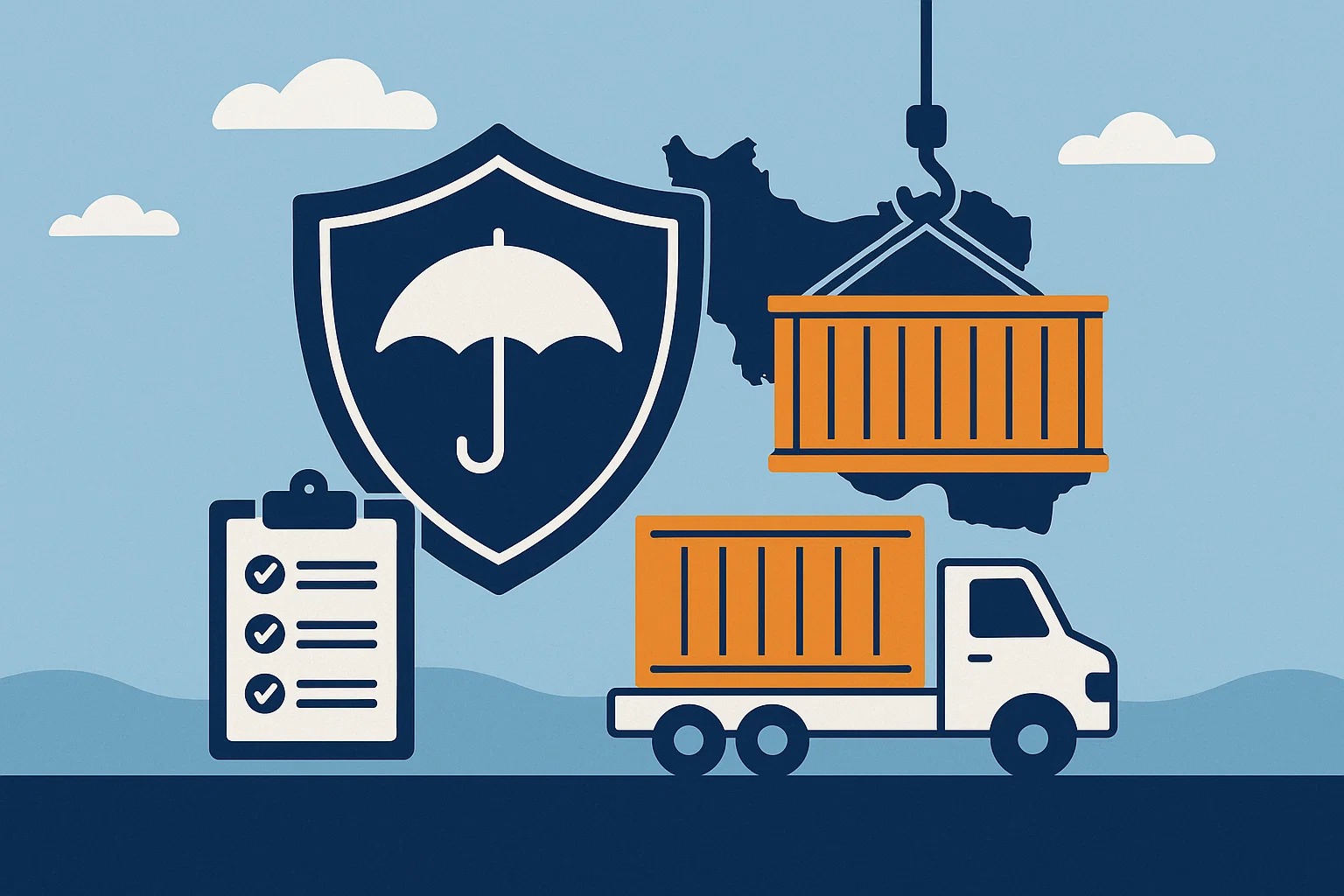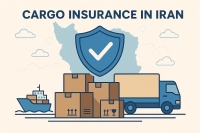What Is Cargo Insurance?
Cargo insurance in Iran is a specialized type of insurance that protects goods against potential financial loss or damage during transportation, whether by land, sea, or air. It is particularly important for exporters, importers, and logistics companies, providing coverage against risks such as accidents, theft, fire, or natural hazards.
Working with reputable cargo insurance companies in Iran can simplify the claims process and provide the necessary support for foreign businesses navigating local regulations and logistics challenges.
Whether shipping goods from Iran to the UAE, Afghanistan, or through Iran to CIS countries, securing cargo insurance is essential for the shipper.
Types of Cargo Insurance
- Import Insurance Iran – Covers goods transported from foreign countries to Iran, ensuring protection from potential losses during transit from the point of origin to the final destination.
- Export Insurance Iran – Protects goods shipped from Iran to international destinations, safeguarding shipments against damage or loss during transportation.
- Marine Cargo Insurance Iran – Specifically designed for goods shipped by sea, this coverage handles risks related to maritime transport, including sinking, collisions, or cargo handling incidents.
- Transit Insurance Iran – For goods passing through Iranian territory en route to other countries, providing coverage against risks such as storage damage, theft, or transit delays.
Who Needs Cargo Insurance in Iran?
Cargo insurance in Iran is especially relevant for businesses engaged in trade with or through the country. Below are the main groups of foreign stakeholders who benefit most:
Foreign Exporters to Iran
Foreign exporters shipping goods to Iran under CIF (Cost, Insurance, and Freight) or CIP terms are responsible for arranging cargo insurance up to the Iranian port of destination. This ensures that goods are covered against transport risks during shipment.
In practice, Iran import export insurance is mandatory for imports, and local banks typically require policies issued by Iranian insurance companies before opening a Letter of Credit (LC). As a result, foreign exporters often need to cooperate with Iranian insurers or rely on the importer to secure local coverage.
Foreign Importers from Iran
Foreign importers buying goods from Iran are responsible for ensuring shipments from the point of loading, especially under FOB (Free On Board) terms. While international insurers can theoretically provide coverage, in practice, sanctions and banking regulations mean most coverage comes through Iranian insurers or their partners (iraninsuranceint.com)
Foreign Entities in Transit through Iran
Iran serves as a key transit corridor between Asia, Europe, and the Middle East. For goods in transit insurance in Iran, foreign-owned cargo needs coverage while moving through Iranian territory. This includes risks during storage, handling, or delays. According to Iranian transit regulations, insurance policies issued by Iranian companies can sometimes substitute for cash guarantees. Even when foreign carriers handle shipments, securing transit insurance Iran is strongly recommended to protect shipments against local risks (selltoiran.com)
Understanding Cargo Insurance Classes in Iran: A, B, and C
Cargo insurance in Iran is classified into three main categories under the Institute Cargo Clauses (ICC): Class A, B, and C, each providing different levels of protection for goods during transport. Choosing the right class depends on the type of cargo, trade terms, and the level of risk coverage required.
Class A – All Risks Coverage
- Definition: The most comprehensive insurance coverage.
- Scope: Protects against nearly all risks of physical loss or damage to cargo, unless specifically excluded.
- Use Case: Ideal for high-value, fragile, or sensitive goods such as electronics, pharmaceuticals, and luxury items.
- Key Benefit: Offers maximum security for shipments under international shipping insurance Iran or marine insurance in Iran, ensuring minimal financial risk.
Class B – Limited Coverage
- Definition: Moderate protection compared to Class A.
- Scope: Covers major risks like fire, explosion, vessel sinking, or certain types of water damage, but excludes minor damages or handling losses.
- Use Case: Suitable for medium-value goods or standard shipments.
- Key Benefit: Balances insurance cost and protection for typical cargo transported under Incoterms and cargo insurance Iran (FOB, CIF, CIP, etc.).
Class C – Basic Coverage
- Definition: The most restrictive type of coverage.
- Scope: Only covers essential risks such as fire or vessel sinking; many common hazards, including handling damage, are excluded.
- Use Case: Best for low-value or low-risk shipments where premium cost is a priority.
- Key Benefit: Offers basic protection while keeping the cargo insurance premium Iran affordable.
Transport of dangerous goods through Iran can be covered by insurance, but they require special declaration, compliance with safety regulations, and often additional or specialized coverage.
Cargo Insurance Process in Iran
Cargo insurance in Iran is a crucial step for protecting goods against potential loss or damage during transportation, whether by sea, air, or road. For foreign traders, understanding the process ensures that shipments are fully covered under the appropriate policy terms.
1. Selecting the Type of Coverage
The process begins by choosing the suitable insurance coverage based on shipment needs and trade terms. Incoterms and cargo insurance Iran (FOB, CIF, CIP, etc.) determine which party is responsible for insurance. For example, under CIF terms, the exporter arranges coverage up to the Iranian port of destination.
2. Choosing a Reputable Insurance Provider
Foreign traders should select experienced insurers for international shipping insurance in Iran. Reliable insurers ensure smooth policy issuance and support in case of claims. Additionally, partnering with a reputable Iranian freight company can simplify both the insurance process and customs clearance, ensuring shipments comply with local regulations.
3. Preparing Required Documents
To issue a policy, insurers require documents such as:
- Commercial Invoice
- Packing List
- Bill of Lading or Air Waybill
- Certificate of Origin
These documents help determine cargo value and risk assessment for risk coverage cargo insurance.In the following sections of the article, we will list these documents in detail and provide full explanations
4. Determining Premium and Policy Terms
The insurer calculates the cargo insurance premium Iran based on the type of goods, transport method, and level of coverage. The cargo insurance policy terms define the insured amount, covered risks, and claim procedures, which are critical for foreign traders to understand before shipment.
5. Policy Issuance and Monitoring
Once approved, the insurance policy is issued, containing all details about the shipment and coverage. Throughout transit, monitoring the cargo ensures that the insurance remains valid and provides protection in case of incidents.
6. Filing Claims and Settlement
In case of damage or loss, the cargo insurance claims process begins. Insurers require incident reports, photos of damaged goods, and supporting documentation to settle claims according to the agreed policy terms.
For more details, see “Transport and Shipment to/from Iran in 2025.”
Top Cargo Insurance Companies in Iran
Here’s a list of Iranian insurance companies that provide import, export, and transit cargo insurance:
- Iran Insurance
- Dana Insurance
- Saman Insurance
- Mellat Insurance
- Parsian Insurance
- Razi Insurance
- Arman Insurance
- Ma Insurance
- Karafarin Insurance
Required Documents for Cargo Insurance in Iran
According to various insurance companies such as Alborz, Saman, Iran Insurance, and Rahkar Tejarat, the following documents are typically required:
- Insurance Proposal Form (Proposal Form or Cargo Insurance Application Form): This includes details of the goods, type of goods, weight, quantity, value of goods, origin and destination, means of transport, transport conditions, and type of coverage.
- Proforma Invoice or Seller's Invoice (Proforma Invoice / Commercial Invoice): This is used to determine the value of the goods, quantity, price, and currency of the transaction.
- Goods Order Registration (for imports): In some companies, it is mandatory that the goods have been registered for import so that the registration number can be included in the proposal form.
- Export Declaration or Export License (for exported goods): This includes the declaration number or export permit issued by customs.
- Type and Name of Currency: This specifies the currency on which the transaction is based, whether it is free market currency or official currency
- Incoterms or Method of Payment for Transport Costs and Responsibilities: This must be specified in the contract or proposal form to indicate where the costs and responsibilities lie from sender to receiver.
- Means of Transport for the Goods: This details whether transport is by ship, truck, train, or airplane; if multiple means are used, all must be mentioned. Source
- Origin of Transport: This refers to the country, city, or port of origin for the goods.
- Packaging Specifications of the Goods: This describes the type of packaging (such as carton, container, pallet, etc.), as proper packaging affects the risk of damage.

Key Factors to Consider When Choosing Cargo Insurance
Choosing the right insurance for your shipments is crucial, especially for businesses dealing with international trade. When looking for cargo insurance in Iran, consider the following factors:
- Type and Value of Cargo: High-value, perishable, or fragile goods require comprehensive coverage. Understanding your cargo helps in selecting appropriate protection.
- Transportation Mode: Whether by sea, air, or land, each mode has unique risks. Ensure the policy covers the specific mode you use.
- Route and Destination: Some routes may have higher risks due to weather, political conditions, or customs procedures. Policies should reflect these factors.
- Insurer Reputation: Choose experienced and reliable companies familiar with Iranian regulations to guarantee smooth claim processes.
- Coverage Terms: Review exclusions, deductibles, and limits. A clear understanding prevents unexpected financial gaps.
- Additional Services: Tracking, risk assessment, and support services can enhance protection and simplify logistics.
By evaluating these factors carefully, businesses can secure the most effective cargo insurance in Iran, protecting shipments and minimizing potential losses.
Summary
In summary, cargo insurance in Iran is an essential component for protecting goods during import, export, and transit operations. Understanding the type and value of cargo, transportation mode, route, and coverage terms helps businesses make informed decisions and mitigate financial risks. While insurance companies provide the policies, freight companies play a critical role in ensuring smooth logistics and compliance with Iranian regulations. Partnering with a reliable freight company, such as SASCO, can simplify customs procedures, facilitate documentation, and coordinate with insurers effectively.







